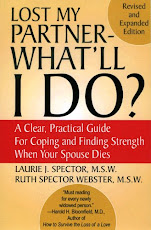
5/28/18
resources for military survivors

Some years years ago, I was privileged to spend Memorial Day Weekend attend an annual TAPS National Military Survivor Seminar and Good Grief Camp for kids. TAPS stands for Tragedy Assistance Program for Survivors, a fantastic support and resource organization founded in 1994 by Bonnie Carroll, who was herself in the military.
I was tremendously impressed by the humility and courage of the widowed spouses/partners and families of our troops and the struggles they encountered dealing with their losses. Visit the TAPS website, taps.org, which offers 24/7 support and information for military survivors and their families. There's both peer and professional support for adults, teens and children.
Also be sure to check out GriefNet.org, which offers specialized online support for military spouse/partners and their families. The site also offers a wide range of other specialized online support groups.
Ruth and I send caring thoughts and our best wishes to all military families, whether they've lost a loved one, have a family member in active duty, or have a veteran in the family.
5/17/18
supportive sites for widowed moms

With Mother’s Day being celebrated this month, we want to remind you of some supportive sites for moms and their kids.
Here are some great online sources of emotional support for grieving children and teens. Be sure to check these out before suggesting them to your child.
The Dougy Center for Grieving Children & Families (www.dougy.org): Headquartered in Portland, Oregon, this excellent organization offers special online activity and advice pages for all ages. The knowledgeable staff can also help you find local support groups for everyone in the family. They also offer books and dvds on how to help children and teens cope with loss.
(Phone toll free: 1-866-775-5683 )
KIDSAID (www.kidsaid.com): An offspring of one of our favorite sites, GriefNet.org, this site offers kids-to-kids e-mail support groups where they can share stories and artwork with each other.
Once you give your permission, these groups (one for under age 12 and one for ages 13-18) are available to your child and monitored by a clinical psychologist. There are also Q&A pages for kids and adults.
Consider also checking online for family bereavement services in your community. You might also contact the social services department at your local hospital for local resources.
Subscribe to:
Posts (Atom)
